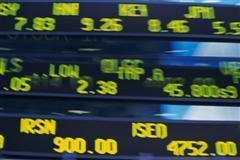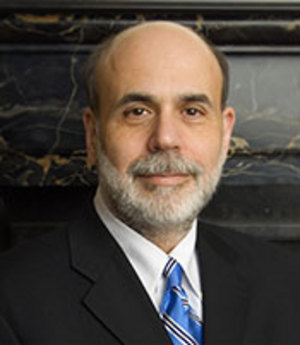| Home | About | Archives | RSS Feed |

@theMarket: Ben Does It Again
 This week's pivotal event was Fed Chairman Ben Bernanke's first press conference with the media. Judging from the price action in the stock market, Ben passed with flying colors.
This week's pivotal event was Fed Chairman Ben Bernanke's first press conference with the media. Judging from the price action in the stock market, Ben passed with flying colors.
The chairman provided a bit of clarity, reassuring the market that in June, when QE II expires, it will be a gradual process of monetary tightening as opposed to a sharp spike in interest rates. Clearly, he gave little comfort to the dollar bulls as the greenback continues its decline (down 8 percent year-to-date) while dashing the hopes of bears in the precious metals markets as gold and silver raced ever higher on a wave of speculative fever and inflation expectations.
Although both Bernanke and U.S. Treasury Secretary Timothy Geithner have expressed their support of a strong dollar policy, neither are doing anything to stem its fall, nor should they, in my opinion. Two years ago I predicted that the U.S. would attempt to export its way out of recession, as would the rest of the world. Judging from the recent spate of quarterly earnings results, U.S. corporations, especially multinations, are making big bucks on the back of the weakening dollar. Profits among corporations are up 26 percent from last year. This will be the seventh quarter in a row where corporations posted double-digit earnings growth.
In Europe, Germany is also benefiting from an upsurge in exports that is helping that country reduce unemployment, propel economic growth and improve corporate profits. At the same time, traditional weak currency, high exporting emerging market countries are feeling the opposite effect as their currencies strengthen, exports slow and imports climb.
Friday's revelation that GDP only grew by 1.8 percent should not have disappointed investors since just about every economist in the nation was predicting as much. Bad weather and the high prices of energy and food were blamed for the less than stellar performance. Most consider it a blip in the forecasts and growth will improve next quarter.
Despite the on-going outrage by commentators (and everyone else who has to eat and drive) about the rising prices of those two commodities, the overall core inflation rate in this country continues to remain below the Fed's targets.
"How can they just ignore gas prices or what I'm paying for meat, milk and even cereal?" demands a client and mother of three, who commutes from South Egremont to Albany every day.
The Fed argues that it cannot control the prices of food and oil, which are set on world markets and represent the totality of demand from around the globe. The central bankers contend that the recent spike in oil, for example, is transitory and will subside over time.
They have a point. Consider food and energy prices in the summer of 2008. They were at record highs only to plummet in the second half of the year. If the Fed had tightened monetary policy (by raising interest rates) in say, June 2008 at the height of the price climb for food and energy, it would have taken six to eight months before those higher rates impacted the economy. By then we were sliding into recession. Tightening would have transformed a serious recession into another Great Depression.
As for the markets, it's steady as she goes, mate, with strong earnings propelling markets closer to my first objective, S&P 500 level of 1,400. I believe we are seeing a little sector rotation going on with consumer discretionary, semiconductors and technology sectors taking a back set this week to industrials, consumer durables and precious metals. Along the way, expect pullbacks but don't be spooked by downdrafts. Take them in stride, stay invested and prosper.
Bill Schmick is an independent investor with Berkshire Money Management. (See "About" for more information.) None of the information presented in any of these articles is intended to be and should not be construed as an endorsement of BMM or a solicitation to become a client of BMM. The reader should not assume that any strategies, or specific investments discussed are employed, bought, sold or held by BMM. Direct your inquiries to Bill at (toll free) or e-mail him at wschmick@fairpoint.net. Visit www.afewdollarsmore.com for more of Bill's insights.
| Tags: bears, Bernanke, QEII, export, interest rates, earnings |
@theMarket: Markets Are Going Higher
|
Fed Chairman Ben Bernanke's putting his faith in the market. |
The above headline may be a bold statement, especially when the averages are already at levels that surpass this year's stock-market highs. But the actions and words of the Federal Reserve Bank this week convinces me that stocks have substantial upside ahead of them.
As I predicted, this week was a big one for investors and the country. The mid-term election results and the resulting legislative gridlock in Washington most pundits expect leaves the Fed as our only hope in reviving the economy and reducing unemployment. (see yesterday's column "Don't Fight the Fed.")
The $600 billion in additional quantitative easing (QE II) and Chairman Ben Bernanke's Op-Ed piece in the Washington Post makes obvious that not only is the Fed targeting stronger growth in the economy but also higher prices in the stock market.
It is the first time in my career that a Fed chairman has explicitly targeted stocks as a tool to increase consumer spending, grow the economy and reduce unemployment.
Imagine my surprise when a day later, the central bank of Japan stated the very same thing but went a step further by also targeting real estate prices in its country.
This takes government support of the economy to an entirely new level in my opinion. During the financial crisis and its aftermath, the government (the Fed, U.S. Treasury and both the Bush and Obama administrations) has on several occasions provided a back stop to the markets. They took actions to save corporations, provided support for declining securities such as mortgage-backed securities, even money markets, and promised to support or bail out the U.S. financial markets with all the power at their disposal. It was one of the main reasons back in early 2009 that I turned bullish on the stock markets. I was betting on the government because they have much deeper pockets then the private sector and if they failed to fulfill their promise we were all doomed anyway.
This week's comments from Bernanke have taken that implicit promise of "support" a big step further. If I read this right, Bernanke is saying that consumers and corporations are still worried about the economy and their own finances. Higher stocks, according to Bernanke, will restore confidence as Americans see their savings rebound. That confidence could lead to additional spending, which would mean more growth in the economy and ultimately lower unemployment. Therefore, insuring that stock prices go higher would accomplish the Fed's mandate of lower unemployment.
Now that does not mean the Fed is simply going to jack up the market in one big melt-up. There will still be corrections. The market is overdue for one right now but over the longer term, at least the next few quarters, I think the fix is in. So if you have been sitting in Treasury bonds or cash waiting for the inevitable second collapse in stocks you may have to wait several more years. In the meantime, you could miss out on a substantial rally in equities.
I also think that we will finally see a dip in the unemployment rate over the next few months. The stimulus money that was spent during the run-up to the elections has generated additional jobs and those jobs are beginning to show up in the data. In addition, I expect U.S. productivity will begin to falter as the economy perks up. So from where I sit, the next few quarters look pretty good for the stock market.
Bill Schmick is an independent investor with Berkshire Money Management. (See "About" for more information.) None of the information presented in any of these articles is intended to be and should not be construed as an endorsement of BMM or a solicitation to become a client of BMM. The reader should not assume that any strategies, or specific investments discussed are employed, bought, sold or held by BMM. Direct your inquiries to Bill at 1-888-232-6072 (toll free) or e-mail him at wschmick@fairpoint.net. Visit www.afewdollarsmore.com for more of Bill's insights.
| Tags: Bernanke, Federal Reserve, stock market |
The Independent Investor: Don't Fight the Fed
 Now that QE II is in the bag, expect QE III, QE IV and maybe even a QE V, if that's what it takes to restore economic growth and reduce the unemployment rate to under 7 percent in this country. After the mid-term election results, I believe the Federal Reserve is all that stands between us and a stagnant, deflationary economy. I would not bet against them in this endeavor.
Now that QE II is in the bag, expect QE III, QE IV and maybe even a QE V, if that's what it takes to restore economic growth and reduce the unemployment rate to under 7 percent in this country. After the mid-term election results, I believe the Federal Reserve is all that stands between us and a stagnant, deflationary economy. I would not bet against them in this endeavor.
Most of Wall Street is expecting fiscal gridlock in Washington now that the GOP has re-taken the House but is still the minority in the Senate. That will mean little if any new initiatives to either grow the economy or drive down unemployment have much chance of passing. One exception may be a compromise on the Bush tax cuts.
If both sides can muster enough cooperation to cut a deal in extending the tax cuts before the end of the year (when they are set to expire) then we may escape an economic knockout punch of monumental proportions. Outside of that, there is not much that we should expect from the government over the next two years.
That means that only the Federal Reserve Bank, led by Chairman Ben Bernanke and his band of 12 governors, are left to wage the good fight against the forces arrayed against our economy. Their mandate, to promote low, stable inflation and a high level of employment, gives them enough latitude to do just about whatever they feel necessary to jump start the economy. It appears they are doing just that.
QE II not only says the Fed is serious about that mission but signals an intention, in my opinion, that if this one doesn't work, another one will already be in the pipeline, followed by another, and another. That is entirely believable since the Fed can and will continue to print money (U.S. dollars) until the cows come home in an effort to grow the economy, which is the only way they can reduce unemployment.
In an Op-Ed piece in the Washington Post on Thursday, Bernanke defended the Fed's second quantitative easing and stated several things that you should read as Gospel:
"... the heavy costs of unemployment include intense strains on family finances, more foreclosures and loss of job skills."
"... inflation is running somewhat below 2 percent."
"... higher stock prices will boost consumer wealth and help increase confidence, which can also spur spending.”
"... Increased spending will lead to higher incomes and profits that, in a virtuous circle, will further support economic expansion."
Bernanke said next to nothing about the dollar since he did not want to give the impression that the U.S. was deliberately driving the dollar lower (although that is exactly what QE II will do). If you don't believe that just take a peek at the decline in the greenback lately. As I have said in the past, the dollar will continue to weaken as the Fed prints more and more money. A lower dollar will boost commodity prices such as gold, silver, energy, materials and agricultural food items. So ignore the naysayers who say commodity prices have run their course.
As far as the Fed is concerned, pumping more money into the economy is OK, at least for now, since the inflation rate is "a bit lower than the rate most Fed policymakers see as being consistent with healthy economic growth in the long run."
But the most important message investors should take away from his Op-Ed is his extraordinary comment concerning higher stock prices. Evidently the Fed believes higher stock prices should be part and parcel of its attempt to grow the economy. The reasoning makes sense when you consider that consumers are the linchpin of this economy. Given that our two main pillars of wealth, our tax-differed retirement savings and our homes, have taken a huge hit since 2008, any improvement in one or both of these assets should help improve our confidence and therefore our spending. That message is clear in the bullet points above.
The Fed is clearly telegraphing to investors that they want a higher stock market, and like unemployment and the economy, they will do what it takes to accomplish that goal. This message is behind the jump in the stock market this week. My advice to you is don't fight the Fed. Buy stocks.
Bill Schmick is an independent investor with Berkshire Money Management. (See "About" for more information.) None of the information presented in any of these articles is intended to be and should not be construed as an endorsement of BMM or a solicitation to become a client of BMM. The reader should not assume that any strategies, or specific investments discussed are employed, bought, sold or held by BMM. Direct your inquiries to Bill at 1-888-232-6072 (toll free) or e-mail him at wschmick@fairpoint.net. Visit www.afewdollarsmore.com for more of Bill's insights.
| Tags: Federal Reserve, Bernanke, economy, stocks |
@theMarket: QE II Supports the Markets
 No, QE II is not the name of a cruise ship; although it might as well be, given the upward ride it is providing the stock market. The Federal Reserve is expected to launch another quantitative stimulus effort in early November and the markets are rising in anticipation of that event.
No, QE II is not the name of a cruise ship; although it might as well be, given the upward ride it is providing the stock market. The Federal Reserve is expected to launch another quantitative stimulus effort in early November and the markets are rising in anticipation of that event.
On Friday, Fed Chairman Ben Bernanke reiterated that the central bank is ready to move if necessary to stimulate the economy. Investors are assuming it's a question of "when" and not "if" the Fed will move to buy additional U.S. Treasury bonds, mortgage-backed securities and whatever else they decide will provide additional impetus to a slow-growth economy.
In an election year, where the continuing high rate of unemployment and the ongoing housing mess is being blamed on the Democrats, the pressure on the Fed for a QE II must be enormous. Remember, at the end of the day, Bernanke is a political appointee, as are the members of the Fed's governing board. Sure, we would like to think that the Fed is an independent body focused solely on the economic health of America and it is most of the time.
On the other hand, if the president's wishes dovetail with what the Fed perceives to be necessary in helping the economy so much the better.
In my last few market columns, I explained that QE II was a game changer. The Fed, by promising additional stimulus, is providing investors with a "put" on the economy and therefore on the stock market. If the economy continues to grow on its own, the markets will go higher. If the economy falters, the Fed will intervene to fix it and the markets will go higher. What's not to like about that?
The arguments on whether we really do need another stimulus, will QE II really work, and will it add to the potential for more inflation down the road are consuming a forest of newsprint. In the meantime, investors are dumping the dollar (see my latest column "The Coming Currency Wars"), the markets forge steadily higher and commodities of all kinds are on fire.
As readers recall, only a month ago I raised my price target for gold to $1,350 per ounce. We have already surpassed that level and it looks like the yellow metal will hit $1,400 per ounce very soon. I'm going to have to raise my price target again but first I would like to see gold and other commodities pull back.
The dollar is key to any commodity correction. There is an inverse relationship between the dollar and commodities. The dollar may bounce over the next few weeks and if it does, that should cause commodities in general to pull back. Remember too that in the commodity arena, corrections are extremely sharp where prices can drop dramatically in a very short time.
As the S&P 500 Index flirts with the 1,180 level, I would expect a bit of resistance before the bulls make a dash toward the year's highs. The ongoing questions over housing foreclosures that have embroiled most of the banking sector this week has kept a lid on the averages. The next Fed meeting won't be until early November so any potential QEII is still weeks away. The main market moving catalyst we face is this quarter's earnings announcements. So far, company results have been a mixed bag. My advice is to let the markets pull back a bit before committing any more money to this party.
| Tags: Federal Reserve, Bernanke, stimulus |
|


